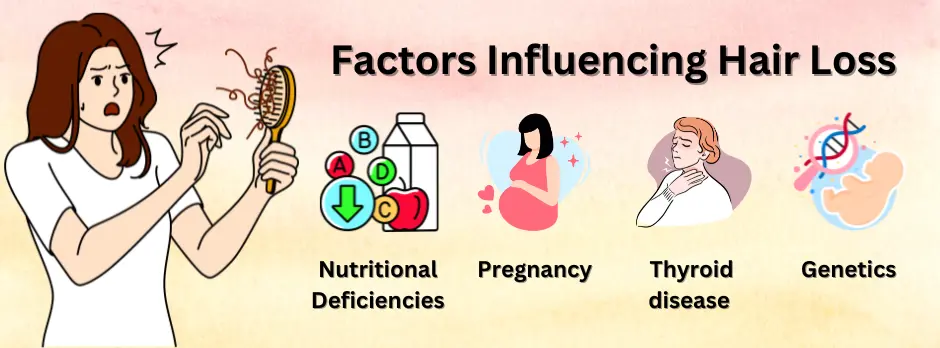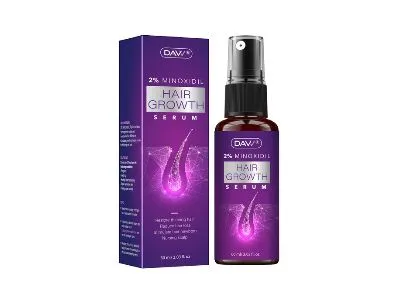Does Pregabalin Cause Hair Loss?

Buyer-Responsibility : It is the buyer’s sole responsibility to verify legality in their jurisdiction.
Pregabalin is a widely prescribed medication primarily used to manage neuropathic pain, seizures, and anxiety disorders. While many patients benefit from its therapeutic effects, concerns about potential side effects often arise. One issue that has gained attention is the possibility of hair loss associated with Pregabalin use.
This blog will explore the relationship between Pregabalin and hair loss, examining scientific research, anecdotal evidence, and potential mechanisms behind this concern. Understanding these connections can help patients make informed decisions about their treatment options. Whether taking Pregabalin or considering it as a treatment option, this information is crucial for managing your health effectively.
Understanding Pregabalin
Pregabalin is a medication commonly used as an effective pain management option for neuropathic pain, along with epilepsy and generalized anxiety disorder (GAD). It is available under the brand names Nervigesic and Lyrica.
Pregabalin is an anticonvulsant drug that works by inhibiting the release of excitatory neurotransmitters, thereby reducing pain perception and stabilizing mood.
The Link Between Pregabalin And Hair Loss
Hair loss is not commonly listed as a primary side effect of Pregabalin. However, anecdotal reports and some patient experiences suggest a possible association. While clinical studies have not strongly linked Pregabalin to hair loss, individual reactions to the drug may vary.
How Does Pregabalin Affect Hair Growth?
Pregabalin may impact hair growth in several ways, leading to increased shedding or thinning.
- Telogen Effluvium – Pregabalin can push more hair follicles into the resting (telogen) phase, causing temporary hair shedding. This type of hair loss is usually reversible once the medication is stopped or adjusted.
- Hormonal Imbalances – Some research suggests that Pregabalin may influence hormone levels, which can disrupt the normal hair growth cycle and contribute to thinning or slower regrowth.
- Reduced Blood Flow to Hair Follicles – Pregabalin may affect nerve signaling and circulation, leading to weakened hair strands and poor follicle health, which can result in hair becoming brittle or falling out more easily.
Pregabalin And Alopecia: What The Research Says
Pregabalin has been associated with hair loss in some patients within 2 to 3 months after starting treatment. In one case, hair loss began just 21 days after initiating pregabalin treatment. This relation between neuropathic pain medication and alopecia hair is thought to result from the medication causing hair to stop growing earlier than it should [1].
Hair growth goes through different stages, and when it reaches the last or the resting stage too quickly, more hair falls out than usual. This condition is known as telogen effluvium, resulting in increased hair shedding [1].
Factors Influencing Hair Loss

Hair loss due to Pregabalin can be exacerbated by a previously unknown underlying genetic tendency or the presence of one or more other hair loss risk factors [3]. It is crucial to rule out other potential causes of hair loss, such as thyroid disorders, stress, and nutritional deficiencies, before attributing hair loss to Pregabalin.
Some of the factors that influence hair loss include-
Nutritional Deficiencies
Nutritional deficiencies, particularly protein, vitamins, and iron, can lead to hair loss. A study on diet and hair loss by Emily L. Guo and Rajani Katta indicates that inadequate nutrition may impact both hair structure and growth [4]. The key nutrients identified in this study, whose deficiencies can contribute to hair loss, include:
- Zinc
- Niacin (Vitamin B3)
- Selenium
- Vitamin D
- Vitamin A
- Vitamin E
- Folic Acid
- Biotin
Addressing these nutritional gaps is essential for maintaining healthy hair.
Thyroid disease
Hair loss can be a significant symptom of severe and prolonged thyroid disorders. Unlike other types of hair loss, this condition typically results in diffuse thinning across the entire scalp rather than isolated patches. Fortunately, hair regrowth is generally possible following effective treatment [5].
Pregnancy
Experiencing hair loss after childbirth is very common. This is due to a decrease in the estrogen level. Pregnancy hair loss affects 40 to 50% of women [6].
Genetics
Hereditary-pattern baldness is one of the leading causes of hair loss, as highlighted by research from Harvard. This condition typically arises from genetic factors, hormonal changes, and the natural aging process. Notably, up to 40% of men and women are affected by hereditary hair loss [7].
Who Is Most At Risk For Hair Loss From Pregabalin?
Some individuals who may be more prone to hair loss while taking Pregabalin include-
- People with long-term Pregabalin use.
- Patients with existing hair loss conditions (alopecia, pattern baldness).
- People with nutritional deficiencies such as iron, biotin, and vitamin D.
- Individuals with high levels of stress and anxiety.
What Are The Early Signs Of Hair Loss From Pregabalin?
The early signs of Pregabalin hair loss include increased hair shedding and thinning, especially on the top of the head. Users may also notice more hair in the hairbrush, pillowcase, and shower drain. Pregabalin use may also cause slower hair regrowth, where the hair may take longer to grow back after shedding.
If you notice these signs while taking pregabalin, consult your healthcare provider immediately.
Pregabalin And Hair Shedding: Is It Permanent?
Hair loss from Pregabalin is generally not permanent. While some individuals may experience this medication-induced hair shedding, it resolves after discontinuing it.
In a case study by Celalletin Turgut and Alparslan Ali, hair loss stopped entirely within 15 days of discontinuing Pregabalin. This highlights that hair regrowth after stopping Pregabalin is possible [1].
It is important to note that individual reactions can vary, so it is important to consult with a doctor.
How Common Is Hair Loss With Pregabalin?
Hair loss with Pregabalin is considered a rare side effect. While not commonly reported, some users have experienced hair thinning or shedding while taking the medication. Clinical trials and post-marketing reports suggest that hair loss occurs in a small percentage of users (about 0.01%), but it is not a widely recognized or frequent issue [2].
Gabapentin Vs. Pregabalin Hair Loss
It is also important to note that hair loss from Pregabalin is much smaller than hair loss due to other nerve pain medications such as Gabapentin. Gabapentin is more commonly associated with hair thinning than Pregabalin.
Managing Hair Loss Caused By Pregabalin
Managing hair loss caused by Pregabalin can be improved in the following ways-
Diet And Supplements

Several studies indicate that vitamin and mineral supplements can improve hair loss symptoms as they are essential for normal cell growth and functioning [8].
Some deficiencies that are associated with hair loss include-
- vitamin D
- iron
- vitamin C
A balanced diet and additional health supplements can help manage hair loss.
Minoxidil Topical Solution
Minoxidil is a treatment used to help with hair loss. It is applied directly to the scalp and improves blood flow to hair follicles, promoting hair growth.
It was initially developed as a medication for high blood pressure and works by widening blood vessels, which increases blood flow to hair follicles, potentially stimulating hair growth [9].
Available in topical forms such as a liquid solution or foam, it typically comes in 2% and 5% concentrations. It is recommended to apply it directly to the scalp twice a day on clean, dry hair for best results.

Pumpkin Seed Oil

Pumpkin seed oil has gained attention as a natural remedy for hair growth, mainly due to its potential to reduce the effects of 5-alpha reductase. This enzyme contributes to hair loss by converting testosterone into dihydrotestosterone (DHT), which can lead to hair thinning [8].
A 2019 study on the beneficial effects of pumpkin seed oil on hair growth suggests that the fatty acids found in pumpkin seed oil promote hair growth. This finding points to pumpkin seed oil as a promising alternative for people looking to treat hair loss naturally [10].
Head Massage
Some studies suggest that regular head massages help make hair grow thicker. Head massages are known to reduce stress, which can contribute to hair loss.
A study by Taro Koyama et al. found that scalp massage can apply gentle pressure to the skin on the head, which might help improve hair thickness [11].
To give yourself a scalp massage, use a head massage tool or simply use your fingers to gently press, stretch, and pinch your scalp for a few minutes each day.

Does Pregabalin Cause Hair Loss – Our Final Thoughts
Pregabalin has been associated with various side effects, though hair loss is not commonly listed among them. However, some individuals have reported experiencing hair loss while taking the medication. It is important to recognize that the side effects of Pregabalin on hair can vary significantly from person to person.
Additionally, hair loss can stem from multiple factors, including stress, hormonal changes, nutritional deficiencies, or genetics.
Medical Disclaimer
All information provided is for informational purposes only. This is not a substitute for professional medical advice.
Disclaimer
This is a generic Gabapentinoid manufactured in India. The original branded version received regulatory approval.
FAQs
Does Lyrica cause hair loss?
How often does Lyrica cause hair loss?
How long does Pregabalin take to cause hair loss?
Can I regrow hair lost due to Pregabalin?
How to stop hair loss from Pregabalin?
How long does it take for hair loss from Pregabalin to stop?
Do all users experience hair loss on Pregabalin?
How Pregabalin interacts with hair follicles?
Is Hair Loss From Pregabalin Worse In Men Or Women?
Can pregabalin cause hair loss?
References
- Hair loss due to Pregabalin: a case report, dergipark.
- Lyrica- Pregabalin capsule, Pfizer.
- Does Gabapentin Make Your Hair Fall Out?, baumanmedical.
- Diet and hair loss: effects of nutrient deficiency and supplement use, NCBI.
- Hair loss and thyroid disorders, btf-thyroid.org.
- Hair Loss During Pregnancy: Telogen Effluvium, americanpregnancy.org.
- Hereditary-patterned baldness, health.harvard.edu.
- How to treat hair loss from medication, medicalnewstoday.
- Minoxidil, wikipedia.
- Beneficial effects of pumpkin seed oil as a topical hair growth promoting agent in a mice model, NCBI.
- Standardized Scalp Massage Results in Increased Hair Thickness by Inducing Stretching Forces to Dermal Papilla Cells in the Subcutaneous Tissue, NCBI.

 info@iyrinhealth.com
info@iyrinhealth.com





